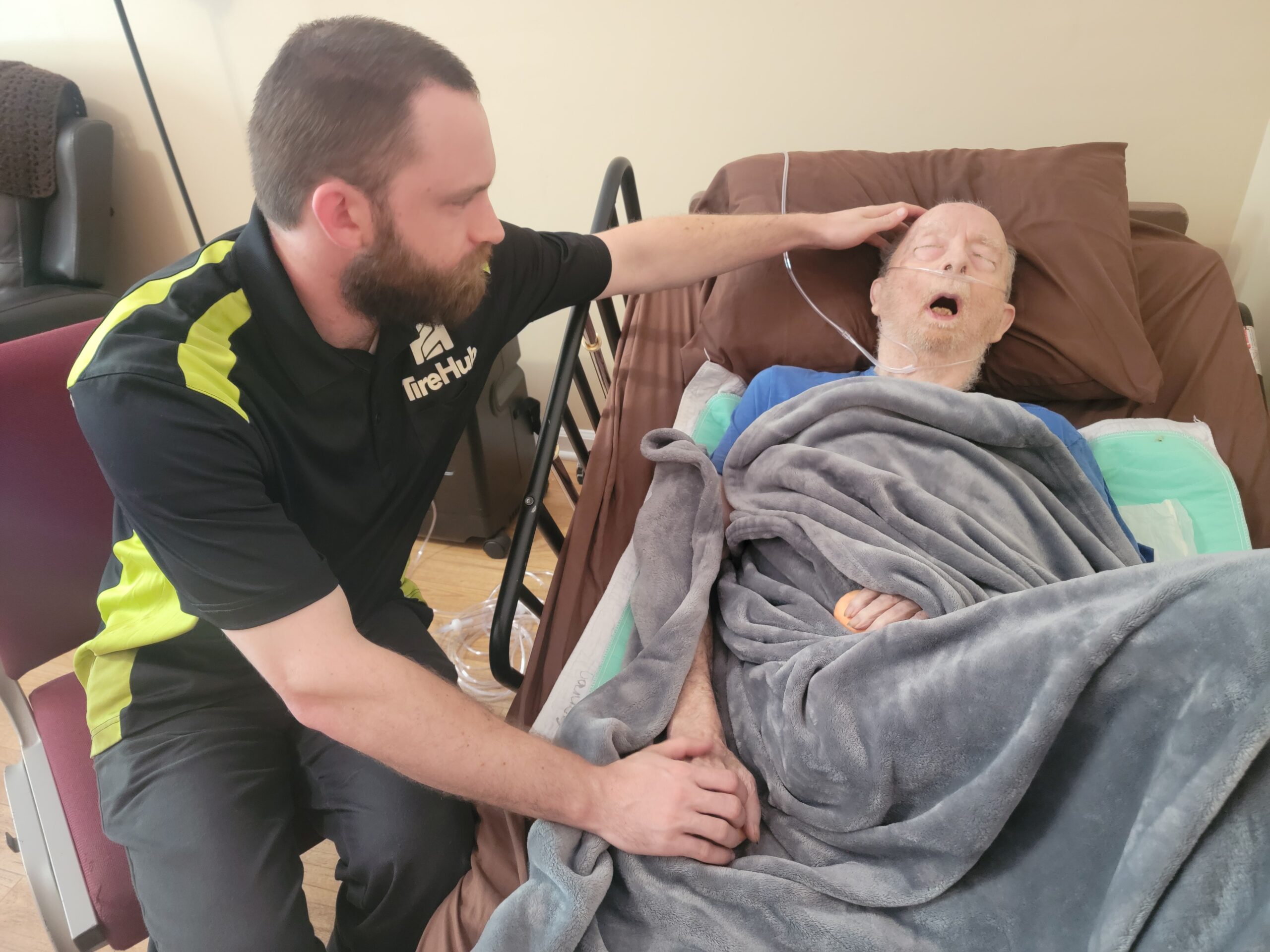Compassion for Outsiders, Love for Enemies, and Jesus’ Great Commission

Compassion for Outsiders, Love for Enemies, and Jesus’ Great Commission – August 3rd, 2025
I’ve always enjoyed hidden clue treasure hunts that involve a series of clues, each leading to the next, eventually culminating in the discovery of some kind of treasure. We’ve celebrated some of our family birthday parties in this way. As we continue our journey through the Gospel of Luke today, we are going to look at two huge hints Jesus gave us, both of which are crucial components of Jesus’ great commission in Luke.
Jesus both shows and tells us to act with compassion for outsiders
Jesus’ first huge hint is in Luke 7:1-10 – “After Jesus had finished all his sayings in the hearing of the people, he entered Capernaum. A centurion there had a slave whom he valued highly, and who was ill and close to death. When he heard about Jesus, he sent some Jewish elders to him, asking him to come and heal his slave. When they came to Jesus, they appealed to him earnestly, saying, ‘He is worthy of having you do this for him, for he loves our people, and it is he who built our synagogue for us.’ And Jesus went with them, but when he was not far from the house, the centurion sent friends to say to him, ‘Lord, do not trouble yourself, for I am not worthy to have you come under my roof; therefore I did not presume to come to you. But only speak the word, and let my servant be healed. For I also am a man set under authority, with soldiers under me; and I say to one, “Go,” and he goes, and to another, “Come,” and he comes, and to my slave, “Do this,” and the slave does it.’ When Jesus heard this he was amazed at him, and turning to the crowd that followed him, he said, ‘I tell you, not even in Israel have I found such faith.’ When those who had been sent returned to the house, they found the slave in good health.”
Here, Luke tells the account of Jesus healing the slave of a centurion. What was a centurion, anyway? They were professional officers in the Roman army, commanding a group of soldiers called a centuria. Originally, a centurion was the commanders of a unit of roughly 100 soldiers, although the exact number varied by this time. It’s important to realize that Jewish law made it clear that Jews were not permitted to associate with Gentiles. Why? Because they were outsiders – outside of the covenant. And, as far as historical records show, all centurions were Gentiles!
Since the story is in Luke chapter 7, and the Latin for “7” is “septem,” I’ll be naming this particular centurion September Sam. September Sam had a slave who was ill and close to death. Let’s pause here and consider what slavery meant in the Ancient Near East. The Ancient Greek historian Xenophon described the accepted practice of treating slaves like domestic animals, punishing them for disobedience and rewarding them for good behavior. In an essay entitled Equality, C. S. Lewis wrote, “Mankind is so fallen that no man can be trusted with unchecked power over his fellows. Aristotle said that some people were only fit to be slaves. I do not contradict him. But I reject slavery because I see no men fit to be masters.” We don’t know much about September Sam, but we do know that he valued this particular slave. Let’s call him Karus, the Latin word meaning “dear, beloved, costly, precious, valued.”
September Sam is a savvy guy. He is used to dealing with people in authority. When September Sam hears about Jesus, his first approach is to send some Jewish elders to make a request. Notice here what Luke does not say. He doesn’t say that September Sam believed that Jesus was the Messiah, the Son of the living God. He doesn’t say that September Sam prayed the sinner’s prayer to receive Jesus as his Lord and Savior. Luke simply says that he heard about Jesus. We don’t know exactly what he heard, but Luke’s statement implies that September Sam had heard about Jesus healing people. After all, in the previous chapter, Luke 6:19, Luke had written, “all in the crowd were trying to touch him [Jesus], for power came out from him and healed all of them.” So, September Sam sends his request via the Jewish elders: Can you please come and heal Karus? He adds some qualifications, unsure of how Jesus will view his highly valued slave: “He is worthy of having you do this for him, for he loves our people, and it is he who built our synagogue for us.”
Luke goes on to tell us that after hearing September Sam’s request, Jesus then goes with the Jewish elders. But before they even arrive at September Sam’s house where Karus lies ill and close to death, September Sam adds a second approach. This time he sends some friends to Jesus: You don’t need to come all the way here to my humble home. Just speak the word, and Karus will be healed. “Speak the word” comes from the Greek eipe logo and refers to the power of the spoken word. September Sam understood a profound revelation about Jesus: Just as September Sam has power and authority over the people under his command, Jesus has power and authority over disease! Luke includes other accounts in the same chapter and elsewhere to show us that Jesus also has power and authority over sin (Luke 7:36-50) and death (Luke 7:11-17). By the power of his spoken word, Jesus heals!
When Jesus hears September Sam’s understanding of authority, chains of command, and the spoken word, Jesus is amazed at him, not at the way he exercised authority, but at his faith. Jesus even draws the ever-present crowd’s attention to the greatness of this Gentile’s faith. N. T. Wright points out the astounding reality, that this Gentile, “for all his lack of appropriate religious background … had grasped the very centre of the Jewish faith: that the one true God, the God of Israel, was the sovereign one, the Lord of heaven and earth. And he had grasped it in its shocking new form: this one true God was personally present and active in Jesus of Nazareth.”
Luke’s final remark on this incident is simply that when the messengers returned home, Karus was in good health! What Luke really wants us to know is that Jesus healed another Gentile! Luke saturates his gospel with so many references to the inclusion of Gentiles in God’s plan, that you’d have to pull a “Thomas Jefferson” to miss them. Jefferson infamously created literal holes in the Scripture by cutting out the parts of the New Testament he found problematic.
Luke’s first huge hint is a model for how we are to treat outsiders: Just as Jesus had compassion on both September Sam and Karus, we are to act with compassion for outsiders, too.
Jesus both shows and tells us to act with love for enemies
Jesus’ second huge hint is in Luke 10:25-37 – “Just then a lawyer stood up to test Jesus. ‘Teacher,’ he said, ‘what must I do to inherit eternal life?’ He said to him, ‘What is written in the law? What do you read there?’ He answered, ‘You shall love the Lord your God with all your heart, and with all your soul, and with all your strength, and with all your mind; and your neighbor as yourself.’ And he said to him, ‘You have given the right answer; do this, and you will live.’ But wanting to justify himself, he asked Jesus, “And who is my neighbor?” Jesus replied [to a lawyer], ‘A man was going down from Jerusalem to Jericho, and fell into the hands of robbers, who stripped him, beat him, and went away, leaving him half dead. Now by chance a priest was going down that road; and when he saw him, he passed by on the other side. So likewise a Levite, when he came to the place and saw him, passed by on the other side. But a Samaritan while traveling came near him; and when he saw him, he was moved with pity. He went to him and bandaged his wounds, having poured oil and wine on them. Then he put him on his own animal, brought him to an inn, and took care of him. The next day he took out two denarii, gave them to the innkeeper, and said, “Take care of him; and when I come back, I will repay you whatever more you spend.” Which of these three, do you think, was a neighbor to the man who fell into the hands of the robbers?’ He said, ‘The one who showed him mercy.’ Jesus said to him, ‘Go and do likewise.’”
The lawyer who stands up to test Jesus is actually an expert in the Mosaic law. Today we would call him a theologian. He poses his seemingly innocuous question to Jesus, “And who is my neighbor?” not because he doesn’t understand who his neighbor is. He would have long ago memorized Leviticus 19:18, “You shall not take vengeance or bear a grudge against any of your people, but you shall love your neighbor as yourself.” Verse 34 of the same chapter goes on to emphasize, “The alien who resides with you shall be to you as the citizen among you; you shall love the alien as yourself.” This expert in the law knows full well who his neighbor is; he is just trying to avoid obedience to what the law requires. It almost sounds like his real question is, Who is not my neighbor? How often do we do the same kind of thing because we just don’t want to love that particular neighbor. It’s so easy to just sit around and continue asking more clarifying questions; it’s much harder to simply obey.
Theologian Ched Myers bluntly calls out a classic intellectual dodge as “problematizing straightforward texts in a way that renders practice impossible or ambiguous.” He reminds us that “Jesus was on a mission to get us to see the world differently.” One of the main ways Jesus did this was by telling parables, whether to open our eyes to see how the world really is, or to offer us a vision of how the world could be.
When we hear the word “Samaritan,” we might feel some warm fuzzies because in our day the word has come to a charitable or helpful person, often someone who reaches out to help others in dire straits. But N. T. Wright points out that “in Jesus’ day the Samaritans and the Jews hated each other like poison … The hatred between Jews and Samaritans had gone on for hundreds of years – and is still reflected, tragically, in the smouldering tension between Israel and Palestine today. Both sides claimed to be the true inheritors of the promises to Abraham and Moses.” Although the lawyer asks, “who is my neighbor?” Jesus responds by asking a slightly different, more retrospective question at the end of his parable that meant, Who turned out to be the neighbor? N. T. Wright explains that Jesus “is urgently offering the way of peace, and only the ‘children of peace’ will escape the self-inflicted judgment that will befall those bent on violence.” The lawyer’s answer to Jesus’ question, “The one who showed him mercy,” sounds good, right? But just in case the lawyer was still thinking about winning points or justifying himself, Jesus said four words that shattered the prevailing view on what it meant to be the people of God: “Go and do likewise.”
New Testament Professor Diane G. Chen speaks to our human tendency towards apathy when “something evidently unjust or wrong cries out for action … acts of justice and mercy are costly, and it is much easier to pretend not to notice – or, worse, to stand and stare but not say a word or lift a finger.” N. T. Wright leaves us with this challenge: “What is at stake, then and now, is the question of whether we will use the God-given revelation of love and grace as a way of boosting our own sense of isolated security and purity, or whether we will see it as a call and challenge to extend that love and grace to the whole world … Today’s preachers, and today’s defenders of the gospel, must find fresh ways of telling the story of God’s love which will do for our day what this brilliant parable did for Jesus’ first hearers.” When we pray for God to direct our steps, or to be the hands and feet of Jesus, or to do small things with great love, what if God brings someone we see as an enemy across our path? Will we respond by passing by on the other side, or will we allow ourselves to be moved by pity and show our neighbor mercy?
Luke’s second huge hint is a model for how we are to treat enemies: Just as Jesus told us to go and do likewise, we are to act with love for enemies, too, with compassion, care, and generosity.
Jesus’ great commission in Luke: We are to proclaim forgiveness of sins in Jesus’ name to all nations
Both of these huge hints are crucial components of Jesus’ great commission in Luke. After Jesus’ resurrection, he says to the two men he is walking with on the road to Emmaus. Luke 24:44-47 – “‘These are my words that I spoke to you while I was still with you—that everything written about me in the law of Moses, the prophets, and the psalms must be fulfilled.’ Then he opened their minds to understand the scriptures, and he said to them, ‘Thus it is written, that the Messiah is to suffer and to rise from the dead on the third day, and that repentance and forgiveness of sins is to be proclaimed in his name to all nations, beginning from Jerusalem.’”
Here, Jesus reminds us that everything written about him, Messiah, in the scriptures, must be fulfilled. Jesus the Messiah has already suffered and risen from the dead on the third day. What is left to be fulfilled is Jesus’ great commission, to proclaim repentance and forgiveness of sins in Jesus’ name to all nations. Jesus gave this great commission not just to the early church but to the whole church throughout all of church history. As the church, we must remain rooted in scripture and active in mission. To proclaim forgiveness of sins in Jesus’ name is to show and tell someone the good news of the kingdom of God. Jesus, by defeating sin and death when he died for us on the cross and rose again, made the way for all people to receive forgiveness and freedom. As we accept Jesus as Messiah and put our faith in Jesus, we become reconciled to God and empowered by the Spirit to experience a transformed life. In Christ, God has made space for us and invited us, welcomed us, and accepted us into the endless dance of love, the eternal embrace of the triune God. As second century Christian bishop Irenaeus famously said, “The glory of God is the human being fully alive.” Jesus Christ, who is fully God and fully human, made the way for us to enter into the fully alive and abundant life that he promised in John 10:10. The two huge hints we’ve looked at today are models for how we are to bring the whole world into the eternal embrace of God’s saving and healing love. Right here, right now, we are to act with compassion for outsiders and with love for enemies, in order to proclaim repentance and forgiveness of sins in Jesus’ name to all nations. And that is what changes the world!
Three stories
I want to close by sharing three stories.
Story number one: On Monday morning I had coffee with one of my fellow seminarians, who was in town for an international campus ministry celebration. Like Cascade, my friend earned his engineering degree at GA Tech before being called by God into ministry. He has served for five years with “Roots,” a campus ministry in Scotland whose official mission statement is “to provide an inviting, grace-driven community for all university students in the city. We seek to tell the story of Jesus in a way that brings a fresh perspective to students’ lives and share how Jesus matters in the world today.” My friend said, “We do radical hospitality and share Jesus.” Recently, one of the ministry’s regulars, a trans man, was on a Scout troop camping trip in the highlands, when some really bad storms rolled in. There was no way they could set up tents in that kind of weather. The Scout leader later told my friend, “At Roots, you have always opened your doors to me. I didn’t know what to do, but I thought about what other kind of group might open their doors to us. It hit me – since Roots always welcomes me, maybe a church would welcome me and my Scout troop.” They found a church in the remote area where they’d been hiking and knocked on the door. The church community not only welcomed the group with open arms; they provided a warm place to sleep and a generous supply of delicious home cooked food. My friend’s story reminded me of Jesus’ words in Matthew 25:35 – “I was a stranger and you welcomed me.” The Greek word for “stranger” is xenos, signifying an alien, guest, outsider, or someone or something unexpected.
Let us consider who are such “outsiders” in our hearts and minds that even the mention of them causes us to bristle on the inside? What could happen if, instead of treating them with cruelty or indifference, we showed compassion for them? How would we respond if God brought them into our lives?
Story number two: Polycarp, who lived from 69-155 AD, was a Christian bishop in Smyrna who had been discipled by the apostle John. In Stephen Tomkins’ abridged version of The Martyrdom of Polycarp, the anonymous author from the church at Smyrna writes, “We are writing to you, brothers, with an account of the martyrs, especially the blessed Polycarp, whose death brought to the persecution to a close. Almost all the events that led up to it reveal it to be another martyrdom in the divine pattern that we see in the Gospel. For he waited for his betrayal, just like the Lord did, so that we might follow him, in looking out for the needs of others as well as ourselves. True love desires not only one’s own salvation, but the salvation of all our brothers.” Shortly after being betrayed by a young man from his own household, notice how Polycarp acted towards his enemies who came to arrest him. “The police and horsemen came with the young man at suppertime on the Friday with their usual weapons … He could have escaped but he refused, saying, ‘God’s will be done.’ When he heard that they had come, he went down and spoke with them. They were amazed at his age and steadfastness, and some of them said. ‘Why did we go to so much trouble to capture a man like this?’ Immediately he called for food and drink for them, and asked for an hour to pray uninterrupted.” Although his arrest meant certain death, Polycarp offered radical hospitality and love for his enemies. If you long for greater courage, commitment, fear of God, or faith, I encourage you to read Polycarp’s whole story!
Let’s be honest about who we consider to be “enemies” to us, such that even thinking about them makes us inwardly seethe. What could happen if, instead of hating or despising them, we instead offered them radical hospitality and loved them. How would we respond if God sent them to our door?
Story number three: My parents both followed Jesus their whole lives. Mom and Dad put their faith in Jesus and were baptized before I was born. This past Monday, the day before my beloved Dad passed, he lay in bed completely fatigued. He had had no food or drink for four days, and his mouth was so parched he could barely speak. Yet, he needed some reassurance as I Paul & I sat beside him holding his hand:
Dad: Did I do good?
Me: Yes, Dad – you’ve been a good dad. You’ve been a good grandpa and great-grandpa! We know that you love us. We love you! Best of all, Jesus loves you and welcomes you, and very soon you’re going to be with God forever! I love you!
Dad: I love you, too.
The next day, as Paul and I again sat beside him holding his hand, I said to my father:
Dad, when our children were little and we were enjoying some kind of celebration at home or away, instead of getting the kids home before their bedtime, we would keep on celebrating and make a little nest of blankets in a corner or on a couch. They would often doze off surrounded by lots of noise, talking, music, and laughter. When it was time to go home, we would pick each of them up, carry them in our arms, and lay them in their beds. Jesus loves you, Dad! He’s coming to carry you in his arms and take you home. All is well. You are going home to God, and we are going to be okay.
And then Dad peacefully and quietly slipped away. All glory to God!
We – the church, you and me and all who are in Christ and still breathing – we have good work to do to participate in fulfilling Jesus’ great commission to the whole church. We do one small thing with great love at a time, in Jesus’ name, by the power of the Holy Spirit, and for the greater glory of God. May we act with compassion for outsiders. May we act with love for enemies. May we proclaim repentance and forgiveness of sins in Jesus’ name to all nations. Let’s go!




